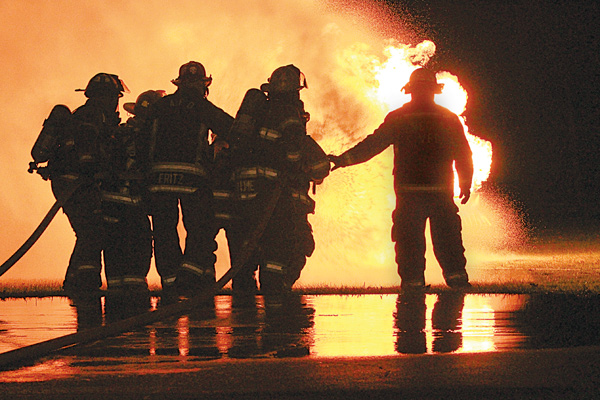MCCTC cadets fight gas fire during training exercise

By JOE GORMAN
jgorman@vindy.com
CANFIELD
Extreme Fire Training

1,000 pounds of LP gas burned during a training exercise for local fire fighters.
Most of us can turn off a faucet. But try turning it off when there’s a raging fire generating temperatures of hundreds of degrees over your head.
Cadets in the firefighter program at the Mahoning County Career and Technical Center had to do that Tuesday as they practiced how to fight a gas fire.
AmeriGas donated about 1,000 pounds of
liquefied petroleum gas, which was set afire in the exercise and towered several feet into the air. Teams of five firefighters would then approach the gas fire wielding two hoses on full throttle and walk right up to the flames.
When they got close enough, one of them would kneel on the ground and turn off the shutoff valve.
Dominic Reinthaler, one of the
cadets, said it took a few seconds to get used to the heat.
“It was a little overwhelming at first,” Reinthaler said.
He said it seemed to take forever when it was his turn to kneel down and turn off the gas. He said the No. 1 thought going through his mind was, “When is this going to stop turning?”
“I thought it would turn forever,” Reinthaler said.
Another cadet, Josh Rhome, said he was hoping the other firefighters in his group would keep up the pressure with the hoses so he could be protected when he reached down to turn off the valve.
He also said the heat was intense.
“As soon as you walk toward it you can feel the heat,” Rhome said.
Don Waldron, an instructor for the school’s fire program and a former Bazetta Township assistant fire chief, said the training is good for the cadets to get them used to handling a fire of such extreme conditions.
He said the exercise’s main purpose was to get them used to the heat and the way they have to turn off the valve to stop the flow of gas to a fire.
“I want them to feel the heat and realize this is a situation they may encounter,” Waldron said.
Former Austintown Fire Chief Andy Frost, who also works at the school, said gas fires are dangerous because of the heat they generate, but the cadets need to be equipped to deal with those situations.
Several firefighters from other departments were on hand as well. Frost said what they learned they can teach to firefighters in their departments.
 43
43
